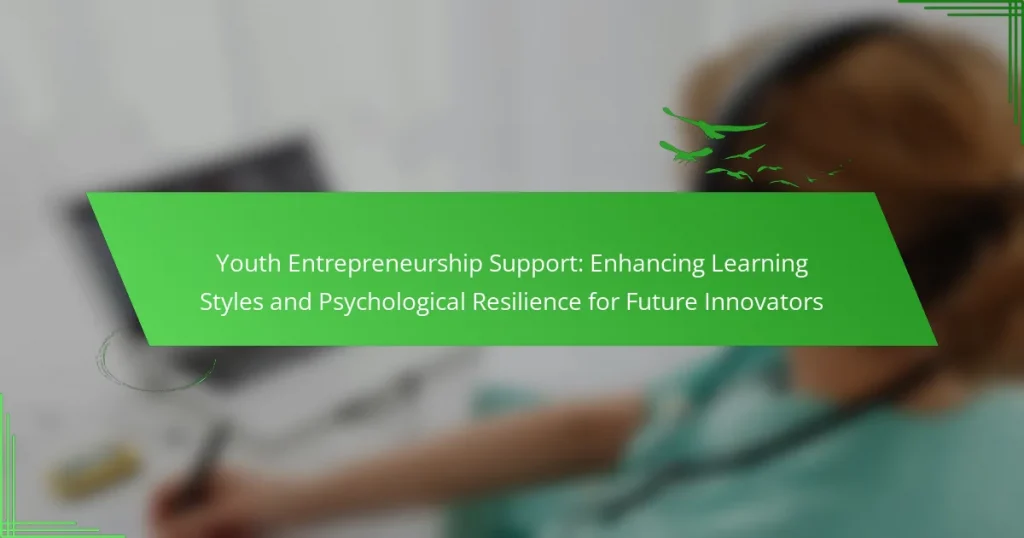Youth entrepreneurship support enhances critical skills and resilience, preparing young innovators for future challenges. This article explores how tailored programs foster experiential learning, mentorship, and collaboration. It highlights the importance of adaptability, optimism, and creativity in developing psychological resilience. Additionally, it examines the unique attributes that contribute to long-term success in entrepreneurship.
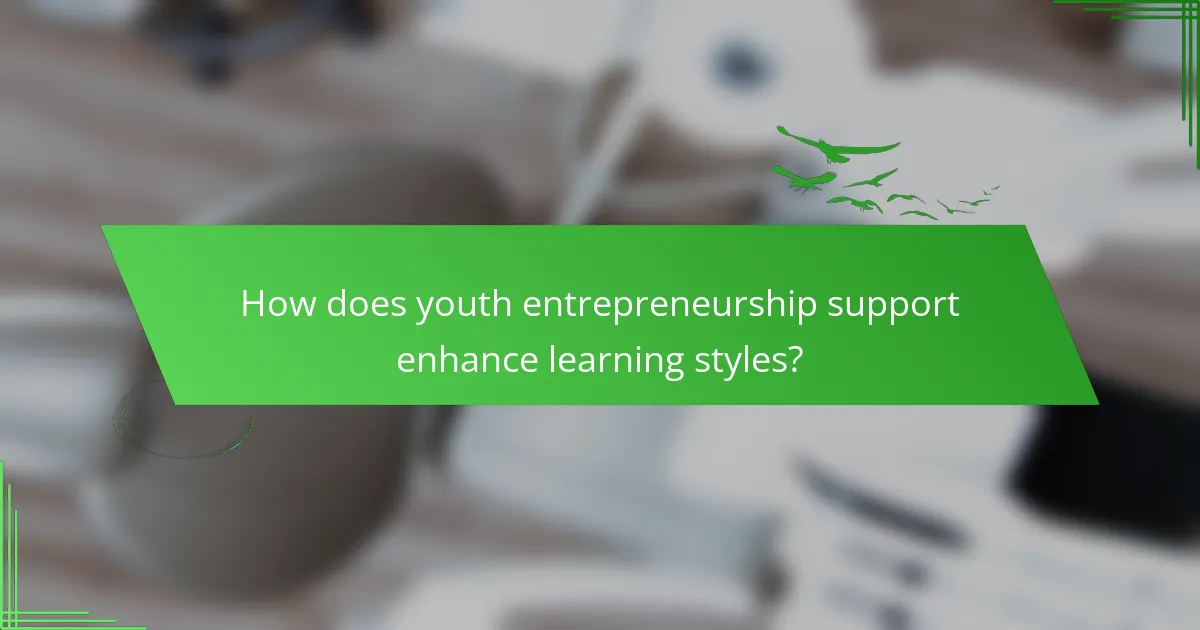
How does youth entrepreneurship support enhance learning styles?
Youth entrepreneurship support enhances learning styles by fostering experiential learning, critical thinking, and adaptability. Programs encourage hands-on projects, allowing youth to engage actively with concepts, which boosts retention and understanding. Additionally, these initiatives promote psychological resilience through problem-solving challenges, preparing future innovators for real-world scenarios. Engaging in entrepreneurship cultivates unique attributes, such as creativity and leadership, essential for navigating diverse learning environments. As a result, youth develop a versatile skill set that aligns with various learning styles, ensuring comprehensive educational growth.
What are the key learning styles relevant to youth entrepreneurship?
Youth entrepreneurship benefits from diverse learning styles that enhance psychological resilience. Key learning styles include visual, auditory, kinesthetic, and interpersonal. Visual learners excel with diagrams and charts, while auditory learners thrive on discussions and lectures. Kinesthetic learners benefit from hands-on experiences, and interpersonal learners gain from group interactions. Understanding these styles fosters an inclusive environment that nurtures future innovators.
How can educators identify diverse learning styles in young entrepreneurs?
Educators can identify diverse learning styles in young entrepreneurs through observation and assessment. Techniques include using learning style inventories, conducting interviews, and facilitating group activities that reveal preferences.
Observational methods highlight engagement levels and interaction styles during tasks. For example, visual learners may prefer diagrams, while kinesthetic learners thrive in hands-on activities.
Implementing varied instructional strategies can further clarify learning preferences. This approach ensures that educators can adapt their teaching methods to support individual learning needs effectively.
Using these strategies fosters an inclusive environment that nurtures psychological resilience among young entrepreneurs, empowering them to innovate confidently.
What tools can be used for assessing learning styles?
Various tools can assess learning styles effectively. These include questionnaires, observation techniques, and learning style inventories. For example, the VARK questionnaire identifies preferences in visual, auditory, reading/writing, and kinesthetic learning. Additionally, tools like the Kolb Learning Style Inventory help determine how individuals approach learning experiences. Using these tools enhances youth entrepreneurship support by tailoring educational strategies to individual needs, fostering psychological resilience and innovation.
How do cultural factors influence learning styles?
Cultural factors significantly shape learning styles by influencing preferences and approaches to education. For instance, collectivist cultures often prioritize collaborative learning, while individualistic cultures may favour independent study. These differences affect how youth entrepreneurs engage with educational resources and develop psychological resilience. Understanding these cultural influences can enhance support systems for future innovators, tailoring learning experiences to fit diverse backgrounds.
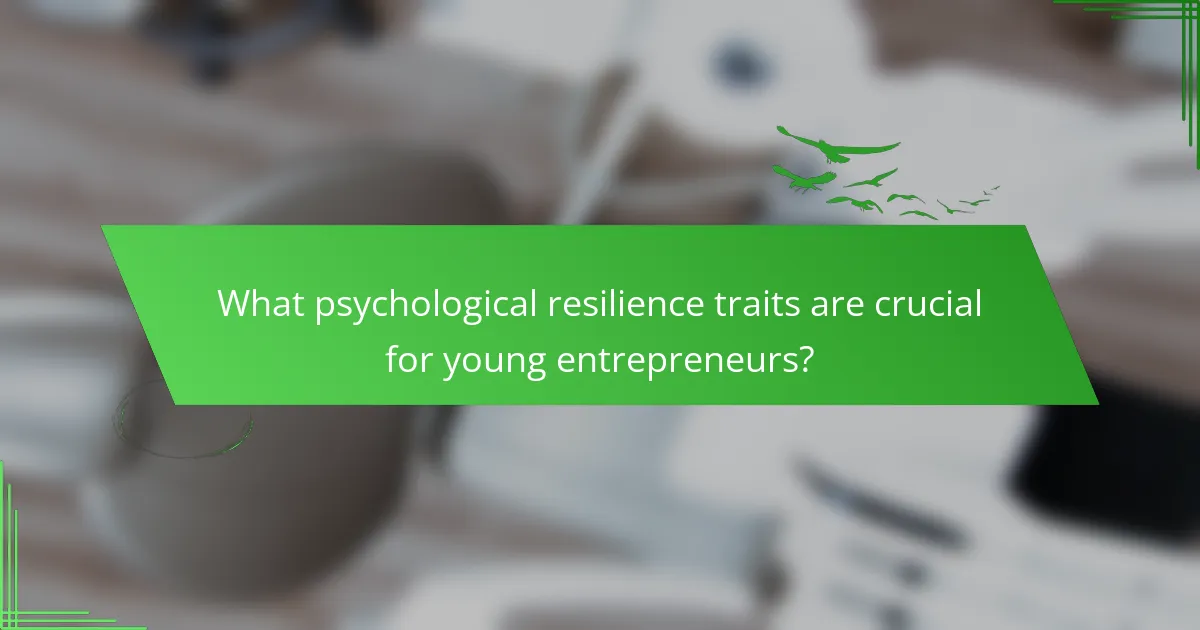
What psychological resilience traits are crucial for young entrepreneurs?
Resilience traits crucial for young entrepreneurs include adaptability, optimism, self-efficacy, emotional regulation, and perseverance. These traits enable them to navigate challenges effectively and maintain motivation. Research shows that adaptable entrepreneurs are more likely to succeed in dynamic markets. Optimism fosters a positive outlook, enhancing problem-solving capabilities. Self-efficacy leads to greater confidence in decision-making, while emotional regulation helps manage stress. Perseverance ensures sustained effort despite setbacks, which is vital for long-term success.
How does psychological resilience impact entrepreneurial success?
Psychological resilience significantly enhances entrepreneurial success by enabling youth to navigate challenges effectively. Resilient entrepreneurs adapt to setbacks, maintain motivation, and foster innovative thinking. Studies show that resilience correlates with higher business performance and sustainability. By cultivating psychological resilience, support programs can empower young innovators to thrive in competitive environments.
What are the core components of psychological resilience?
Psychological resilience consists of key components that support individuals in overcoming challenges. These components include emotional regulation, optimism, social support, problem-solving skills, and adaptability. Emotional regulation helps individuals manage stress and maintain focus. Optimism fosters a positive outlook, encouraging persistence. Social support provides a network for encouragement and resources. Problem-solving skills enable effective navigation through obstacles. Adaptability allows individuals to adjust to changing circumstances, enhancing overall resilience.
How can young entrepreneurs develop coping strategies?
Young entrepreneurs can develop coping strategies by fostering psychological resilience and adapting learning styles. Engaging in mindfulness practices enhances emotional regulation, while seeking mentorship provides guidance and support. Additionally, setting realistic goals helps manage stress and maintain motivation. Building a supportive network encourages collaboration and resource sharing, which is vital for overcoming challenges.
What role does mentorship play in building resilience?
Mentorship significantly enhances resilience in youth entrepreneurship by providing guidance and emotional support. Mentors share experiences, helping mentees navigate challenges. This relationship fosters a growth mindset, enabling young innovators to adapt and persevere. Studies show that mentees often exhibit higher levels of self-efficacy, a crucial attribute for resilience. Additionally, mentorship can offer unique networking opportunities, further bolstering confidence and resourcefulness in entrepreneurial ventures.

What universal benefits does entrepreneurship education provide?
Entrepreneurship education provides universal benefits such as enhanced critical thinking, improved problem-solving skills, and increased psychological resilience. These attributes prepare youth for innovation and adaptability in diverse environments. Research indicates that students engaged in entrepreneurship programs exhibit higher levels of confidence and motivation, leading to better academic performance. Additionally, exposure to entrepreneurial concepts fosters creativity and collaboration, essential skills for future leaders.
How does entrepreneurship education foster critical thinking?
Entrepreneurship education enhances critical thinking by encouraging problem-solving and innovation. It promotes analytical skills through real-world challenges, fostering adaptability in youth. Programs often incorporate collaborative projects, which deepen understanding and encourage diverse perspectives. As a result, students develop resilience and confidence in their decision-making abilities.
What skills are enhanced through entrepreneurship programs?
Entrepreneurship programs enhance critical thinking, problem-solving, and communication skills. Participants improve their ability to innovate and adapt to challenges, fostering psychological resilience. These programs also cultivate leadership qualities and teamwork, essential for future success.
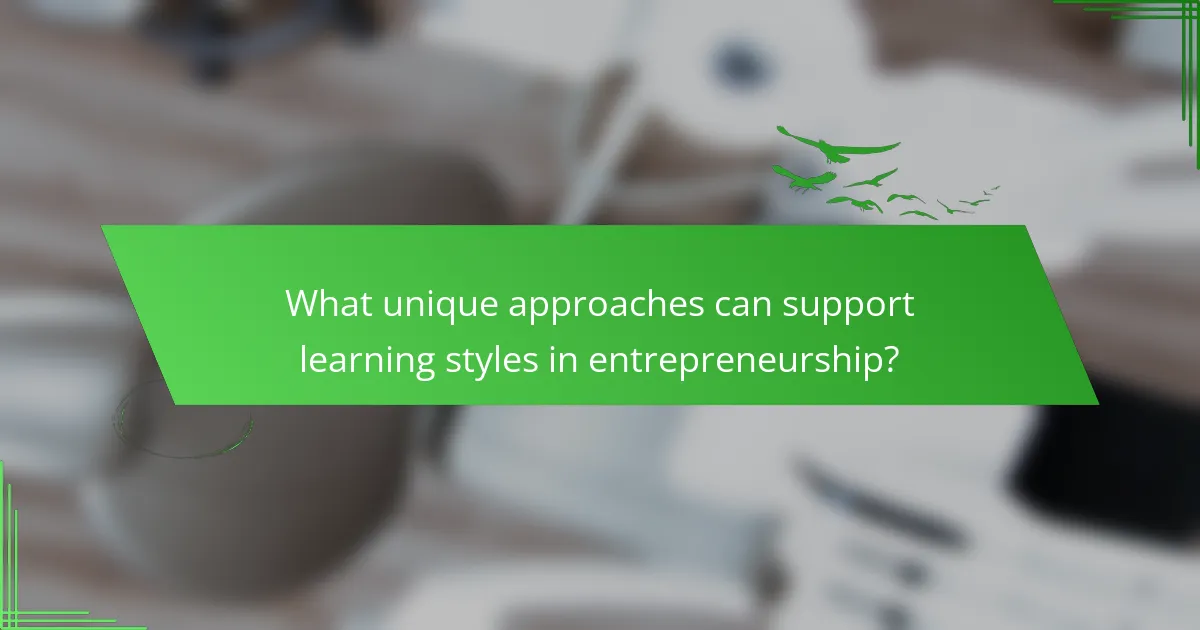
What unique approaches can support learning styles in entrepreneurship?
Innovative approaches to support learning styles in youth entrepreneurship include experiential learning, mentorship programs, and adaptive technology. Experiential learning allows students to engage in real-world projects, enhancing practical skills. Mentorship programs connect young entrepreneurs with experienced professionals, fostering guidance and support. Adaptive technology personalizes learning experiences, catering to individual preferences and improving retention. These strategies collectively enhance psychological resilience, preparing future innovators for challenges.
How can tailored learning experiences improve engagement?
Tailored learning experiences significantly enhance engagement by aligning educational methods with individual learning styles. This personalization fosters psychological resilience, empowering youth entrepreneurs to innovate effectively. Engaged learners are more likely to participate actively, retain information, and apply skills in real-world scenarios. Research shows that customized approaches can increase motivation by up to 30%, leading to improved outcomes in entrepreneurship education.
What innovative teaching methods are effective for diverse learners?
Innovative teaching methods that effectively support diverse learners include project-based learning, differentiated instruction, and collaborative learning. These approaches enhance engagement and accommodate various learning styles. Project-based learning fosters real-world problem-solving skills, while differentiated instruction tailors lessons to individual needs. Collaborative learning promotes peer interaction, boosting psychological resilience. Research shows these methods significantly improve academic outcomes and prepare youth for entrepreneurship.

What rare attributes contribute to successful youth entrepreneurs?
Successful youth entrepreneurs often possess rare attributes that significantly enhance their potential. These attributes include creativity, adaptability, and a strong sense of social responsibility. Creativity allows them to develop innovative solutions and products, while adaptability helps them navigate challenges and changing market conditions. A strong sense of social responsibility drives them to create businesses that contribute positively to society, fostering community engagement and sustainability. These rare attributes combined can lead to unique business approaches and long-term success in entrepreneurship.
How does emotional intelligence influence entrepreneurial outcomes?
Emotional intelligence significantly enhances entrepreneurial outcomes by fostering better decision-making and resilience. Entrepreneurs with high emotional intelligence navigate challenges effectively, build strong relationships, and inspire teams. This leads to increased innovation and adaptability in dynamic markets. Research indicates that emotionally intelligent leaders are more likely to create successful ventures, as they can manage stress and motivate others. Furthermore, emotional intelligence contributes to psychological resilience, enabling youth entrepreneurs to overcome setbacks and pursue their goals persistently.
What uncommon traits have been observed in successful young innovators?
Successful young innovators often exhibit uncommon traits such as adaptability, strong emotional intelligence, and a propensity for risk-taking. These attributes enable them to navigate challenges and capitalize on opportunities effectively.
Adaptability allows them to pivot when faced with obstacles, while emotional intelligence fosters collaboration and understanding in diverse teams. Risk-taking is crucial for innovation, as it encourages experimentation and learning from failure.
Research indicates that these traits correlate with higher success rates in entrepreneurship. For instance, a study found that emotionally intelligent leaders are 60% more likely to inspire their teams.
In summary, the combination of adaptability, emotional intelligence, and risk-taking distinguishes successful young innovators in the competitive landscape of entrepreneurship.
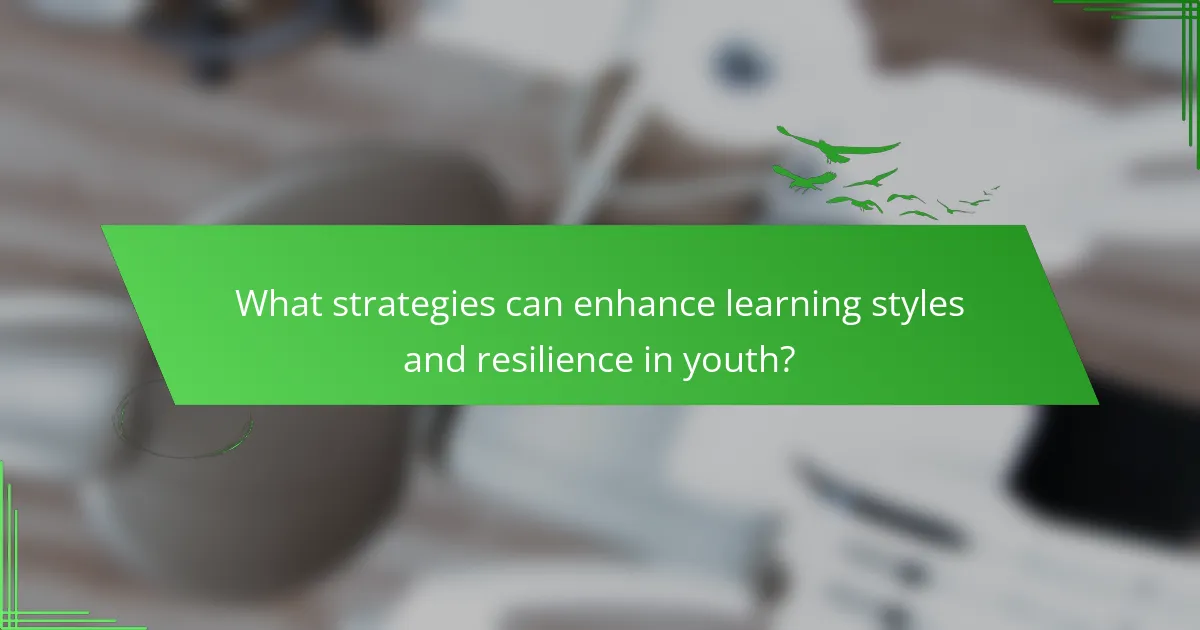
What strategies can enhance learning styles and resilience in youth?
Youth entrepreneurship support enhances learning styles and resilience through tailored programs. These strategies include mentorship, experiential learning, and collaborative projects. Mentorship provides personalized guidance, fostering adaptability. Experiential learning encourages practical application, reinforcing knowledge retention. Collaborative projects build teamwork skills, promoting psychological resilience. Emphasizing these approaches cultivates innovative thinkers prepared for future challenges.
How can collaborative projects improve learning and resilience?
Collaborative projects enhance learning and resilience by fostering teamwork and problem-solving skills. They create environments where youth can experiment, innovate, and learn from failure. This process builds psychological resilience, as participants develop coping strategies and adaptability. Engaging in diverse group dynamics encourages different learning styles, promoting inclusivity and enhancing overall educational outcomes.
What best practices should educators adopt for effective youth entrepreneurship support?
Educators should adopt experiential learning, mentorship programs, and resilience training for effective youth entrepreneurship support. These practices foster innovation and adaptability in young entrepreneurs.
Experiential learning involves hands-on projects that encourage creativity and problem-solving. Mentorship programs connect students with experienced entrepreneurs, providing guidance and real-world insights. Resilience training equips youth with coping strategies, enhancing their ability to navigate challenges.
By integrating these best practices, educators can cultivate a supportive environment that nurtures future innovators.
What common mistakes should be avoided in entrepreneurship education?
Entrepreneurship education often overlooks critical aspects that can hinder effectiveness. Common mistakes include neglecting diverse learning styles, underestimating psychological resilience, and failing to provide practical experiences. These oversights can lead to disengagement and limited innovation potential among youth. Addressing these issues can significantly enhance the educational experience and outcomes for future entrepreneurs.
How can feedback loops be implemented to foster continuous improvement?
Feedback loops can be effectively implemented by establishing regular check-ins and evaluations. These processes allow youth entrepreneurs to reflect on their experiences, gather insights, and adapt strategies based on feedback.
One approach is to create structured mentorship programs where mentors provide constructive feedback on business ideas and execution. This interaction fosters psychological resilience as young innovators learn to navigate challenges.
Additionally, using surveys and feedback forms can capture diverse perspectives, enabling continuous improvement in learning styles. Tracking progress through these tools enhances adaptability, a unique attribute crucial for future innovators.
Incorporating peer feedback sessions encourages collaboration, allowing participants to learn from each other’s experiences. This rare approach builds a supportive community that reinforces resilience and innovation.
